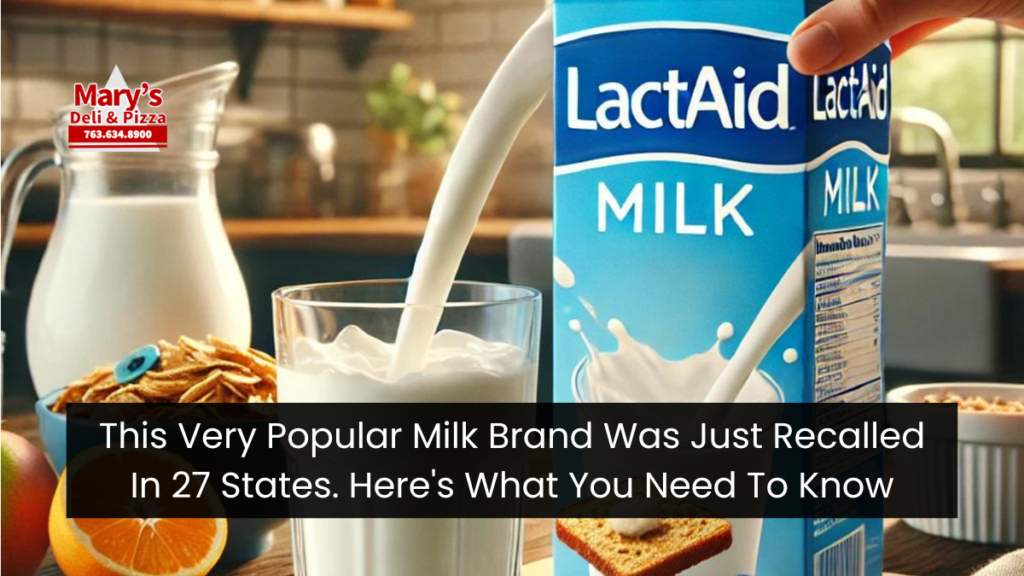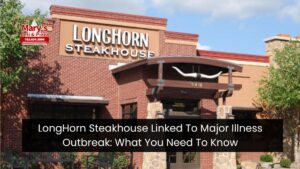A popular milk brand, Lactaid, which is known for its lactose-free dairy products, is facing a significant recall that has raised concerns among consumers across 27 states in the United States.
On September 20, 2024, HP Hood in collaboration with the U.S. Food and Drug Administration (FDA), issued a voluntary recall of specific 96-ounce containers of Lactaid milk.
The recall comes after it was discovered that certain batches of Lactaid milk may contain trace amounts of almonds, an allergen that was not declared on the product label.
The recall affects several varieties of Lactaid milk, including whole milk, 2% milk, 1% milk, fat-free milk, and calcium-enriched varieties.
While no illnesses have been reported, the potential presence of almond traces could pose a significant health risk to consumers with almond allergies, leading to severe allergic reactions or even life-threatening complications.
What Led to the Recall?
The recall was initiated after routine maintenance tests detected the potential contamination in Lactaid Milk products.
According to the FDA, the possible presence of almonds, which are not listed on the product label, could cause severe or life-threatening allergic reactions for individuals with nut allergies.
While no adverse health events have been reported so far, the recall is being conducted as a precautionary measure.
The Importance of Food Safety and Consumer Health
The presence of undeclared allergens in food products is a serious issue, especially for individuals with food allergies.
Almond allergies, in particular, can cause anaphylaxis, a potentially life-threatening allergic reaction that requires immediate medical attention.
Symptoms of almond allergies include hives, swelling, difficulty breathing, and dizziness. For this reason, it is critical for food manufacturers to accurately label their products to prevent such health risks.
According to the FDA, the problem was identified during routine maintenance testing, which detected the potential for cross-contamination with almond products.
The recall is being conducted out of an abundance of caution to protect consumers, even though no illnesses have been reported.
In a statement provided by HP Hood, the company emphasized its commitment to consumer safety, stating that its allergen management and sanitation practices are aligned with industry standards to prevent the presence of undeclared allergens in food products.
However, this incident underscores the importance of continued vigilance in maintaining food safety protocols.
Affected Products
The recall affects five varieties of Lactaid Milk:
- Whole Milk
- 1% Milk
- 2% Milk
- Fat-Free Milk
- 2% Calcium-Enriched Milk
These products were distributed between September 5 and September 18, 2024, and were sold in major grocery stores across the following 27 states:
Alabama, Colorado, Connecticut, Florida, Georgia, Iowa, Illinois, Indiana, Kansas, Kentucky, Louisiana, Maryland, Michigan, Minnesota, Missouri, Mississippi, North Carolina, Nebraska, New Jersey, New York, Ohio, Oklahoma, Pennsylvania, Texas, Virginia, Wisconsin, and Wyoming.
Identifying Affected Products
Consumers can identify if they have a recalled product by checking the code “51-4109 P2” and the “Best By” dates printed at the top of the 96 oz container.
The Best By dates range from November 22, 2024, to December 5, 2024, depending on the variety of milk.
What Should You Do If You Have a Recalled Product?
Consumers who have purchased the affected products should take immediate action by either:
- Returning the product to the place of purchase for a full refund or exchange.
- Properly disposing of the product: If you choose to dispose of the product, ensure that it is securely wrapped to prevent others from consuming it.
- Contact HP Hood: For more information, you can reach HP Hood’s customer service hotline at 800-242-2423 between 9 a.m. and 5 p.m. ET, Monday through Friday.
Additionally, the FDA recommends thoroughly cleaning any surfaces or utensils that may have come into contact with the recalled milk.
This includes washing kitchen countertops, cutting boards, and refrigerators with hot, soapy water and sanitizing with a solution of one tablespoon of chlorine bleach per gallon of water. This ensures that no residual allergens remain in your kitchen environment.
Conclusion:
While recalls of food products are always concerning, the swift response from HP Hood and the FDA shows the importance of proactive measures to protect public health.
If you have purchased any of the affected Lactaid milk products, it’s crucial to follow the recall guidelines and avoid consuming the product, especially if you or someone in your household has a nut allergy.
Keeping informed about recalls can help ensure you and your family remain safe from potential allergens or other harmful substances.
FAQs
1. How do I know if I have purchased the recalled Lactaid milk?
Check the container for the code “51-4109 P2” and the Best By date, which should range from November 22, 2024, to December 5, 2024.
2. What varieties of Lactaid milk are being recalled?
The recall affects whole milk, 1% milk, 2% milk, fat-free milk, and calcium-enriched varieties sold in 96-ounce containers.
3. How many states are affected by this recall?
The recall covers 27 states, including major regions like California, Texas, New York, and Florida.
4. What should I do if I have purchased the recalled Lactaid milk?
You can return the product to the store for a refund or properly dispose of it, ensuring that you clean any surfaces that came into contact with the milk.
5. Has anyone reported any illnesses related to this recall?
As of now, no illnesses have been reported, but the recall is being conducted to prevent potential allergic reactions.






